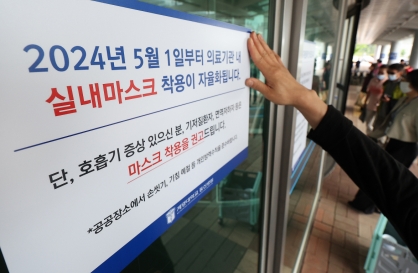Parliament to hold emergency sessions over Kim’s death
By Korea HeraldPublished : Dec. 19, 2011 - 21:02
Alarmed South Korean lawmakers quickly agreed Monday to hold emergency meetings of various committees at the National Assembly to discuss the death of North Korean leader Kim Jong-il and create measures to cope with the aftermath.
The North’s state media reported earlier in the day that the 69-year-old Kim died of a heart attack on Saturday. South Korea’s military has been placed on emergency alert and its foreign ministry also placed its overseas diplomatic missions on emergency standby.
Floor leaders of the ruling Grand National Party and the main opposition Democratic Unity Party hurriedly met after the announcement of Kim’s sudden death and reached an agreement to hold special sessions of foreign affairs, trade and unification, national defense and intelligence on Tuesday with senior government officials, party officials said.
While the officials said the special sessions are aimed at discussing parliamentary-level emergency measures and ways to minimize the impact on the peninsula, opposition parties are likely to criticize the Lee Myung-bak administration’s intelligence-gathering in regard to the North.
“Our intelligence network failed to discover the death of North Korea’s top leader over the last two days. It is a direct example of (South Korea’s) holes in intelligence gathering on the North," the DUP spokesman Lee Yong-sup said at a briefing.
A GNP lawmaker, who spoke on condition of anonymity, said, "There is no room for excuses by the government for remaining unaware of Kim’s death for two days, even in consideration of North Korea’s reclusiveness.”
Political parties are paying close attention to the power transition and possible power struggle in the North, as Kim’s youngest son and heir apparent Kim Jong-un, aged in his late 20s, was tapped to be the communist state’s next leader.
“We have to come up with thorough measures to prepare for all possible scenarios, even those with only 0.1 percent chance of happening,” the GNP’s interim leader Park Geun-hye said. “I think it is time to make bipartisan efforts for national security.”
DUP’s former floor leader Park Jie-won called on the Seoul government to cooperate with regional powers to help get the impoverished North back on track.
“It is very shocking to me,” said Park, who accompanied late president Kim Dae-jung to the first inter-Korean summit in June 2000. “We have to work with the U.S. and China to bring North Korea under control,” thus lessening security concerns on the Korean Peninsula.
Whether Kim’s youngest son can propel the dynasty into a third generation of leadership is a crucial issue to the political parties, which are preparing for next year’s major polls.
South Korea will elect a new parliament in April and vote on a new president in December of next year. It will be the first time in two decades the two polls will be held in the same year.
(Yonhap News)
The North’s state media reported earlier in the day that the 69-year-old Kim died of a heart attack on Saturday. South Korea’s military has been placed on emergency alert and its foreign ministry also placed its overseas diplomatic missions on emergency standby.
Floor leaders of the ruling Grand National Party and the main opposition Democratic Unity Party hurriedly met after the announcement of Kim’s sudden death and reached an agreement to hold special sessions of foreign affairs, trade and unification, national defense and intelligence on Tuesday with senior government officials, party officials said.
While the officials said the special sessions are aimed at discussing parliamentary-level emergency measures and ways to minimize the impact on the peninsula, opposition parties are likely to criticize the Lee Myung-bak administration’s intelligence-gathering in regard to the North.
“Our intelligence network failed to discover the death of North Korea’s top leader over the last two days. It is a direct example of (South Korea’s) holes in intelligence gathering on the North," the DUP spokesman Lee Yong-sup said at a briefing.
A GNP lawmaker, who spoke on condition of anonymity, said, "There is no room for excuses by the government for remaining unaware of Kim’s death for two days, even in consideration of North Korea’s reclusiveness.”
Political parties are paying close attention to the power transition and possible power struggle in the North, as Kim’s youngest son and heir apparent Kim Jong-un, aged in his late 20s, was tapped to be the communist state’s next leader.
“We have to come up with thorough measures to prepare for all possible scenarios, even those with only 0.1 percent chance of happening,” the GNP’s interim leader Park Geun-hye said. “I think it is time to make bipartisan efforts for national security.”
DUP’s former floor leader Park Jie-won called on the Seoul government to cooperate with regional powers to help get the impoverished North back on track.
“It is very shocking to me,” said Park, who accompanied late president Kim Dae-jung to the first inter-Korean summit in June 2000. “We have to work with the U.S. and China to bring North Korea under control,” thus lessening security concerns on the Korean Peninsula.
Whether Kim’s youngest son can propel the dynasty into a third generation of leadership is a crucial issue to the political parties, which are preparing for next year’s major polls.
South Korea will elect a new parliament in April and vote on a new president in December of next year. It will be the first time in two decades the two polls will be held in the same year.
(Yonhap News)
-
Articles by Korea Herald




![[Music in drama] Rekindle a love that slipped through your fingers](http://res.heraldm.com/phpwas/restmb_idxmake.php?idx=644&simg=/content/image/2024/05/01/20240501050484_0.jpg&u=20240501151646)

![[New faces of Assembly] Architect behind ‘audacious initiative’ believes in denuclearized North Korea](http://res.heraldm.com/phpwas/restmb_idxmake.php?idx=644&simg=/content/image/2024/05/01/20240501050627_0.jpg&u=20240502093000)



![[KH Explains] Will alternative trading platform shake up Korean stock market?](http://res.heraldm.com/phpwas/restmb_idxmake.php?idx=644&simg=/content/image/2024/05/01/20240501050557_0.jpg&u=20240501161906)








![[Today’s K-pop] Stray Kids go gold in US with ‘Maniac’](http://res.heraldm.com/phpwas/restmb_idxmake.php?idx=642&simg=/content/image/2024/05/02/20240502050771_0.jpg&u=)